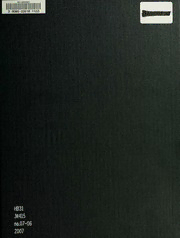
Current account deficits in rich countries PDF
Preview Current account deficits in rich countries
Digitized by the Internet Archive in 2011 with funding from Boston Library Consortium Member Libraries http://www.archive.org/details/currentaccountde00blan2 HB31 .M415 \o.ol- Massachusetts Institute of Technology Department of Economics Working Paper Series CURRENT ACCOUNT DEFICITS IN RICH COUNTRIES Olivier Blanchard Working Paper 07-06 Feb 2007 0, 1 Room E52-251 50 Memorial Drive MA Cambridge, 02142 This paper can be downloaded without charge from the Social Science Research Network Paper Collection at http://ssrn.com/abstract=963 98 1 ~ MASS.' :~"' ITE OFTECH FEE 2 2 2007 LIBRARIES Current Account Deficits in Rich Countries Olivier Blanchard * February 10, 20007 (first draft: October 30, 2006). * MIT and NBER. Mundell-Fleming lecture given, at the IMF in November 2006. I thank Ricardo Caballero, Francesco Giavazzi, Guido Lorenzoni, Andrei Shleifer, Roberto Rigobon, and Jose Tessada for comments and discussions. I thankTatianaDidier for excellent research assistance. Abstract Current account imbalances have steadily increased in rich countries over the last 20 years. While the U.S. current account deficit dominates the numbers and the news, other countries, especially within the Euro area, are also running large deficits. These deficits are different from the Latin American deficits ofthe early 1980s, or the Mexican deficit of the early 1990s. They involve rich countries; they reflect mostly private saving and investment decisions, and fiscal deficits often play a marginal role; and the deficits are financed mostly through equity, FDI, and own-currency bonds rather than through bank lending. Yet, there appears a widely shared worry that these deficits are too large, and government intervention is required. My purpose, in this lecture, is to examine the logic of this argument. I ask the following question: Assume that deficits reflect private saving and investment decisions. Assume also that people and firms have rational expectations. Should the government intervene, and, if so, how? To answerthe question, I construct asimple benchmark. In the benchmark, the outcome is first best and there is no need norjustification forgovernment inter- vention. I then introduce simple distortions in either goods, labor, or financial markets, and characterize the equilibrium in each case. I derive optimal policy and the implications for the current account. I show that optimal policy may or may not lead to smaller current account deficits. Iseethemodelandtheextensionsverymuch asafirst pass. Sharperconclusions require abetterunderstandingofthe exactnatureand theextent ofdistortions, and we do not have it. Such understanding is needed however to improve the quality ofthe current debate.
